159 North 3rd Street
Macclenny, Florida 32063
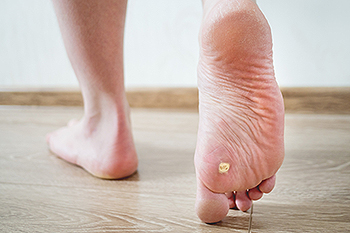
People who are afflicted with plantar warts may have difficulty walking. These growths are found on the soles of the feet and can cause severe pain and discomfort. This is a result of the consistent weight the feet endure while walking and standing during the day. Plantar warts are caused by a virus that is known as the human papillomavirus, or HPV. This virus is contagious, and lives in warm and moist environments. These can consist of public swimming pools, locker rooms, and shower room floors. It is beneficial to wear appropriate shoes while in these areas, such as flip flops or water shoes. This type of wart will generally take several weeks or months to completely disappear. Many patients seek treatment to relieve the pain, which may include removal for faster relief. If you have a plantar wart, it is suggested that you speak to a podiatrist who can guide you toward the treatment that is correct for you.
Plantar warts can be very uncomfortable. If you need your feet checked, contact Dr. John L. Coleman from Florida. Our doctor will assist you with all of your foot and ankle needs.
About Plantar Warts
Plantar warts are the result of HPV, or human papillomavirus, getting into open wounds on the feet. They are mostly found on the heels or balls of the feet.
While plantar warts are generally harmless, those experiencing excessive pain or those suffering from diabetes or a compromised immune system require immediate medical care. Plantar warts are easily diagnosed, usually through scraping off a bit of rough skin or by getting a biopsy.
Symptoms
Treatment
To help prevent developing plantar warts, avoid walking barefoot over abrasive surfaces that can cause cuts or wounds for HPV to get into. Avoiding direct contact with other warts, as well as not picking or rubbing existing warts, can help prevent the further spread of plantar warts. However, if you think you have developed plantar warts, speak to your podiatrist. He or she can diagnose the warts on your feet and recommend the appropriate treatment options.
If you have any questions please feel free to contact our office located in Macclenny, FL . We offer the newest diagnostic and treatment technologies for all your foot and ankle needs.
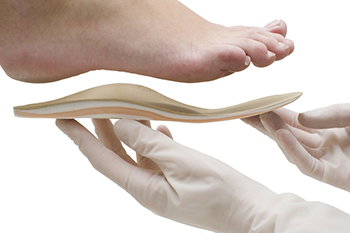
Lower back pain is not something to take lightly, as it can dramatically affect your overall health and well being. Interestingly, lower back pain has a notable connection to the feet, since the feet are essentially the foundation of the entire human body. Orthotics, or shoe inserts that are custom or over-the-counter, can be used to address lower back pain. Orthotics are a non-surgical, non-invasive option that might be used by patients to address their lower back pain without undergoing a surgical procedure. The orthotics can be used to put the feet in optimal alignment and motion, thereby supporting the back. If you are someone that is struggling with lower back pain or chronic back pain, it is suggested that you schedule an appointment with a podiatrist who can provide guidance, advice, and assistance regarding custom orthotics.
If you are having discomfort in your feet and would like to try orthotics, contact Dr. John L. Coleman from Florida. Our doctor can provide the care you need to keep you pain-free and on your feet.
What Are Orthotics?
Orthotics are inserts you can place into your shoes to help with a variety of foot problems such as flat feet or foot pain. Orthotics provide relief and comfort for minor foot and heel pain but can’t correct serious biomechanical problems in your feet.
Over-the-Counter Inserts
Orthotics come in a wide variety of over-the-counter inserts that are used to treat foot pain, heel pain, and minor problems. For example, arch supports can be inserted into your shoes to help correct overarched or flat feet, while gel insoles are often used because they provide comfort and relief from foot and heel pain by alleviating pressure.
Prescription Orthotics
If over-the-counter inserts don’t work for you or if you have a more severe foot concern, it is possible to have your podiatrist prescribe custom orthotics. These high-quality inserts are designed to treat problems such as abnormal motion, plantar fasciitis, and severe forms of heel pain. They can even be used to help patients suffering from diabetes by treating foot ulcers and painful calluses and are usually molded to your feet individually, which allows them to provide full support and comfort.
If you are experiencing minor to severe foot or heel pain, it’s recommended to speak with your podiatrist about the possibilities of using orthotics. A podiatrist can determine which type of orthotic is right for you and allow you to take the first steps towards being pain-free.
If you have any questions please contact our office located in Macclenny, FL . We offer the newest diagnostic and treatment technologies for all your foot and ankle needs.
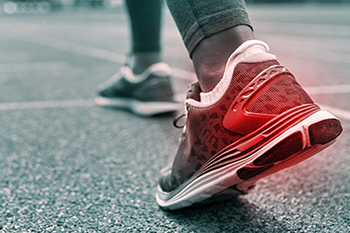
There are several factors that can be taken into account while choosing the right running shoe. It is helpful to plan ahead, which can include deciding on what surface will be trained on, in addition to how the shoes will feel. Many people enjoy walking before beginning a running routine, and this can be useful in observing the gait. It is beneficial for individuals to learn how the joints in the feet are aligned, which may help to determine what type of running shoe will be purchased. It is important to find shoes that fit correctly, ensuring there is adequate room between the end of the toes and the tip of the shoes. Running shoes last approximately 300 miles, or three to four months for people who regularly run, and it is beneficial that they are promptly replaced for maximum foot protection. There are several types of shoes to choose from, and if you are interested in pursuing running as a hobby, it is suggested that you confer with a podiatrist. This type of doctor can guide you toward purchasing the shoes that are best for you and your style of running.
You should always make sure your running shoes fit properly in order to avoid injury. For more information, contact Dr. John L. Coleman from Florida. Our doctor can provide the care you need to keep you pain-free and on your feet.
Choosing the Right Running Shoe for Your Foot Type
Improper shoe sizing can cause a myriad of problems for your feet. Shoes that don’t fit you properly can lead to muscular imbalances in your body, which can result in foot, knee, and hip injuries.
Tips for Finding the Right Running Shoe
If you have any questions please feel free to contact our our office located in Macclenny, FL . We offer the newest diagnostic and treatment technologies for all your foot and ankle needs.
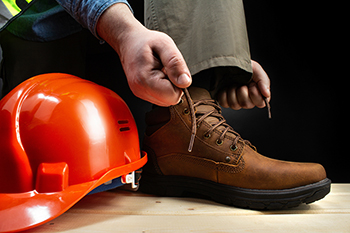
Sitting at a desk all day long, with little time for movement, or spending prolonged time working on your feet, both have challenges. Paramedics, nurses, teachers, wait staff, and retail workers are some examples of those who spend a significant amount of time standing or walking while working. There are things one can do to minimize the detrimental effects of working on the feet. Simple things include investing in comfortable, supportive, and well-fitting footwear, getting feet massaged, and soaking one’s feet after a long day. One can also stretch the feet and legs if they must spend significant time on their feet while working. Calf raises and standing on one’s toes and balancing are things that can be done within minutes while at work and without raising awareness or requiring extra space or equipment. Elevating the feet when given a chance is helpful too. As people who have sedentary types of jobs need to make time to move more, and those who spend most of their workday on their feet need to make time for relaxation. If you have foot pain from having a job that requires you to be on your feet for an extended time, consider seeing a podiatrist for more helpful tips to increase your comfort and prevent chronic foot issues.
While working on the feet, it is important to take the proper care of them. For more information about working on your feet, contact Dr. John L. Coleman from Florida. Our doctor will treat your foot and ankle needs.
Working on Your Feet
Standing on your feet for long periods of time can cause stress and pain in your feet. Your whole body may experience change in terms of posture, back pain, bunions, callouses and or plantar warts. There are ways to avoid these conditions with proper foot care, smart choices and correct posture.
Positive Changes
Negative heeled shoe – Choosing this shoe type places the heel slightly lower than the ball of the foot. These are great for overall foot health. Find shoes that fit you correctly.
Go barefoot – Our feet were not designed to be enclosed for all hours of the day. Try to periodically expose your feet to air.
Eliminate Pain
Foot Exercises – Performing simple exercises, incorporating yoga and doing stretches are beneficial. This will allow increased blood flow to the area and muscles of the foot.
Achilles tendon – Stretching the foot out flat on the floor will relax the calf muscles and tendon. These exercises can be performed almost anywhere. Make sure you add these exercises to your daily regimen.
With a little bit of this information and knowing more about foot health, you will notice changes. Foot stretches and proper footwear will help with pain and prevent further issues.
If you have any questions please feel free to contact our office located in Macclenny, FL . We offer the newest diagnostic and treatment technologies for all your foot and ankle needs.
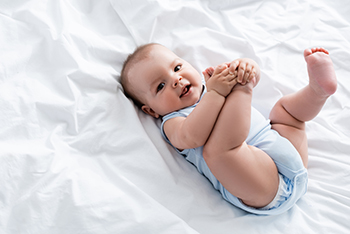
It is common for new parents to be nervous that their newborn is healthy. When foot problems are detected prior to or at birth, parents are naturally concerned. Common congenital foot problems include rotational issues, such as in-toeing or out-toeing and flat feet. In-toeing are when the baby’s feet turn inward; out-toeing is the opposite. Children are born with flat feet and the arch of the foot can either be flexible or rigid. This usually resolves itself as the child grows. Most of the time, parents simply need to be reassured that their child will grow out of the condition they are noticing. However, surgery may be required for children after age 8 if a deformity interferes with normal functioning. If you are expecting a baby or have recently given birth, it is suggested that you consult with a podiatrist to discuss newborn feet, have any concerns put to rest, and treat any feet problems that may need attention.
Congenital foot problems require immediate attention to avoid future complications. If you have any concerns, contact Dr. John L. Coleman of Florida. Our doctor can provide the care you need to keep you pain-free and on your feet.
Congenital foot problems are deformities affecting the feet, toes, and/or ankles that children are born with. Some of these conditions have a genetic cause while others just happen. Some specific foot ailments that children may be born with include clubfeet, polydactyly/macrodactyly, and cleft foot. There are several other foot anomalies that can occur congenitally. What all of these conditions have in common is that a child may experience difficulty walking or performing everyday activities, as well as trouble finding footwear that fits their foot deformity. Some of these conditions are more serious than others. Consulting with a podiatrist as early as possible will help in properly diagnosing a child’s foot condition while getting the necessary treatment underway.
What are Causes of Congenital Foot Problem?
A congenital foot problem is one that happens to a child at birth. These conditions can be caused by a genetic predisposition, developmental or positional abnormalities during gestation, or with no known cause.
What are Symptoms of Congenital Foot Problems?
Symptoms vary by the congenital condition. Symptoms may consist of the following:
Treatment and Prevention
While there is nothing one can do to prevent congenital foot problems, raising awareness and receiving neonatal screenings are important. Early detection by taking your child to a podiatrist leads to the best outcome possible.
If you have any questions please feel free to contact our office located in Macclenny, FL . We offer the newest diagnostic tools and technology to treat your foot and ankle needs.